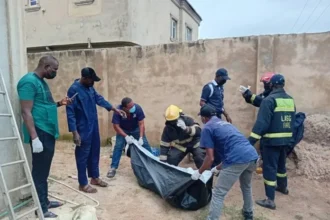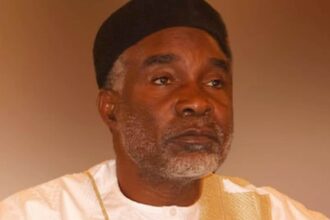...To get all news updates, Join our WhatsApp Group (Click Here)
Also Join our WhatsApp Channel (Click Here)
Emerging report shows that all is not to be going well in One of Nigeria’s struggling commercial Bank, Polaris Bank, as fear of imminent distress has reportedly enveloped the financial institution, sparking disquiet among some customers and other stakeholders.
In 2018, the Central Bank of Nigeria took over the bank while it was on the brink of collapse, rebranding it as Polaris Bank. Four years later in October 2022, the CBN sold it in a move that has been widely criticized.
Instead of bringing the needed succour, the Bank has been enmeshed in serious crises of survival, the latest being the mass suspension of over 100 managers and unpaid arrears of workers salaries.
In order not to be caught unawares, some customers of the bank especially small and medium enterprises are reportedly taking their money out of Polaris Bank to safer banks, giving them the opportunity to have sound sleep and have nothing to worry about for fear of imminent distress.
According to inside sources in the bank, lately the bank has lost some customers (depositors) who are edgy about their deposits and have lost trust in the bank because of huge job losses and unethical industrial practices currently going on in the bank.
Investigations by this newspaper revealed that for the second month, over 100 branch managers of the bank are placed on suspension without pay for having non performing loan ratio above 5%.
However, it was gathered that these loans were duly approved and interests earned by the bank. Some of the managers told our correspondent that they did not book most of the loans but the loans were referred and booked by other senior staff who are walking about freely.
By labour laws, suspension without pay should not exceed two weeks but the bank initially issued a letter of suspension for 30 days. After the expiration, the suspension without pay continued for two months without further advise to the staff.
According to our sources, management has insisted that staff on suspension must come to work daily and are drilled for performance review on a daily basis with the managing director presiding over the weekly meetings which last late into the nights.
Industry watchers insisted that the move by the management of the bank showed that all is not well within the system and the managers may have been victims of scapegoatism due to imminent distress in the system.
Our investigations revealed that because of the obvious signs of distress in the bank, a number of individuals and SMEs have closed their accounts with the bank and moved their deposits to safer banks.
A dealer on building materials in the popular Jabi market (name withheld) said: “I decided to move my business away from Polaris Bank due to their inhuman treatment of my account managers. Earlier in the year, they sacked the manager who convinced me open an account with the bank few years back.
“I had also introduced him to many other dealers and I learnt the branch was profitable. I was still pondering over the job loss of my financial advisor and how solvent the bank was, when the new manager who took over from him informed me that he is already on suspension without pay yet the management insists he must resume everyday and asking for more business,” he said.
Similar stories are rife with customers of Polaris Bank. The bank is one of the lowest paying commercial banks in the country. We learnt that their pay structure is so poor that they are unable to headhunt staff from other banks.
We gathered that what the management has resorted to doing is to employ new staff on a different salary cadre which means new staff earn higher than old staff on the same grade. This has alerted industry watchers to the unhealthy state of the bank.
A management staff of the bank who spoke to our correspondent on condition of anonymity said the bank was looking into these issues but that the story was meant to create panic in the industry. He appealed to customers to exercise patience with the bank while it navigates through the difficult phase.
You can get every of our news as soon as they drop on WhatsApp ...To get all news updates, Join our WhatsApp Group (Click Here)
Also Join our WhatsApp Channel (Click Here)












